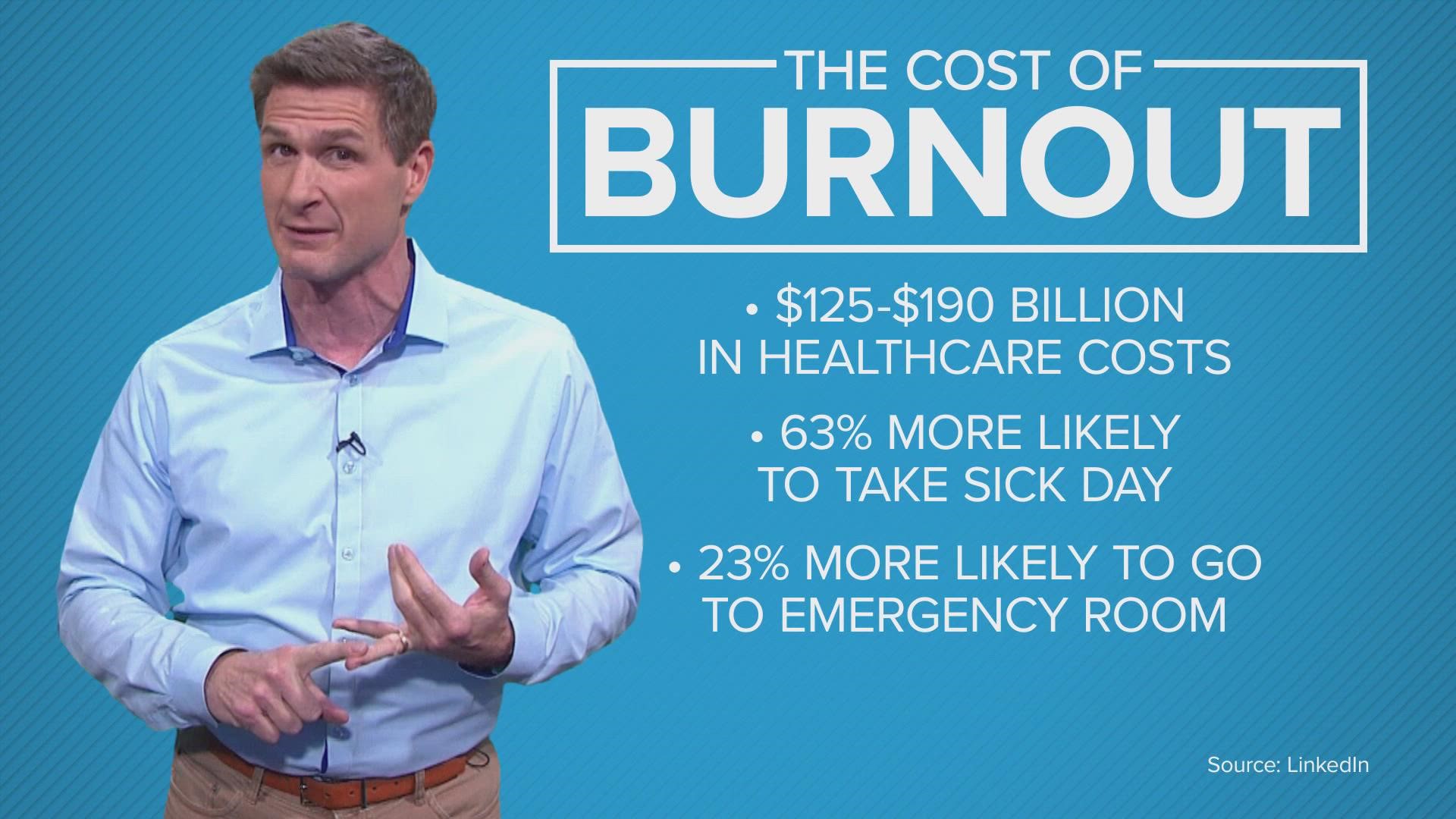TEXAS, USA — Have you gotten there yet…to the point where you are totally burned out at work?
The so-called Burnout Barometer is out. It is based on a nationwide survey by a biotech company and says the average Texas worker who started with a clean slate at the beginning of the year got overwhelmed, overloaded, hit the work wall and reported burnout 191 days into the year way back on July 10. It also breaks down the average date of burnout by profession.
Personally, I think I was already flirting with it in late January or early February! I have been in the total overload zone before, too. But this time, I had to learn (again) that as an employee, you have to set boundaries, be proactive, talk about burnout with your workplace management and find a way to make changes before you hit the wall.
Time to evaluate your situation. And yourself…
Based on personal experience, it helps a lot to go into those discussions with your employer calmly explaining how much you are getting done and what specifically is making your workload difficult to manage. As with all meetings with managers, it also helps a lot for you to go into that with some solutions in mind that are beneficial to you, while also still helping your employer get what they need.
Additionally, it helps to look at your own processes and efficiencies (or inefficiencies). Even if you think you are doing everything you can to maximize effort and make the best use of your time and skills, chances are there are some improvements you can make that will allow you to work ‘smarter…not harder’.
I found that it helped me to be a better planner, and to allow for more time for different activities so that I wasn’t always so rushed and so stressed. Taking occasional short breaks and getting enough rest are also very important. Here are more suggestions from the American Psychological Association.
Burnout may be costly for the employee and the employer
From the management side, you should know that not all employees are going to speak up. They may just internalize the stress. But often, that stress comes out in ways that are not good for your business or for the health of your employees.
Statistics say that each year, burnout in this country creates between $125 Billion and $190 Billion in healthcare costs and burned out employees are 63% more likely to take a sick day. They’re 23% more likely to visit an emergency room.
Stats also show that about 40% of workers who leave their jobs go because of stress, and that even the burned-out workers who stay and become disengaged cost their employers 34% of their annual salary because they become less productive.
Some of the symptoms of burnout
We joke about burnout sometimes, but it is serious stuff. There are some actual symptoms, listed by Gallup. Any of those look familiar?
–Depleted or exhausted
–Mentally distant from job/negative feelings or cynicism about job
-Reduced professional efficacy
-Most energy/mental focus is on daily survival, not developing for the future
What can employers do?
Business owners and managers are crucial in tamping down burnout at work. Just like individual employees, it is a best practice for management to take a critical look at how much is being expected of an employee. Is it manageable and realistic?
How is the work culture? Do you truly believe that your employees feel comfortable coming to you to talk about burnout? Can they have confidence that you will work with them to address that? Does your workplace have a good track record of solving problems and finding solutions when issues are brought to your attention? And do you see some signs of burnout in your employees (and if so, are you doing anything about that)?
Here and here you will find some good resources about being a more effective workplace leader when trying to combat burnout on the job.
The opposite end of the burnout spectrum: Quiet quitting
Not everybody is burning out. ‘Quiet quitting’ has been a big trend, especially among younger employees. The focus with this is to not actually quit your job, but to just show up and do the bare minimum at work. With a lot of available jobs and not enough workers, quiet quitters may feel empowered to make work less of a priority.
If this describes you, be careful. The job market that has been desperately in need of workers throughout this year will not always provide such a forgiving safety net for underachievers who might eventually be relieved of their duties at work when replacement workers are not so hard to come by…or when the economy slows and staffing cuts become necessary.
Also, if you have been quietly quitting, you could have a lot of trouble getting good references. And ambitious co-workers might use you as an example for why they should be promoted, instead of you.
‘Good Money Revolution’ author and financial expert Derrick Kinney says that pitch might go something like this: “I know others have this mentality but I am coming here to work. I am coming here to help you grow your business, increase sales, reduce costs, help make a name for myself in this company…you will have more opportunities because you are going to be in the minority of people who express I want to be here, I want to grow, and I want to make more money.”
If you are the opportunistic ambitious one though, pace yourself…because as explained above, burnout is also real.

